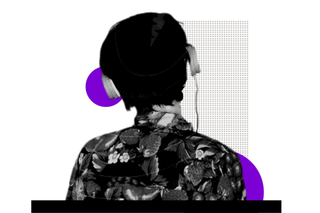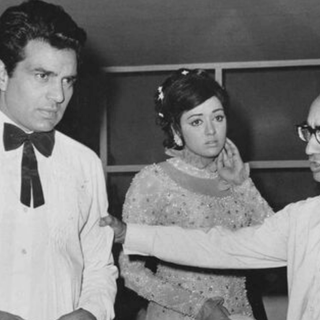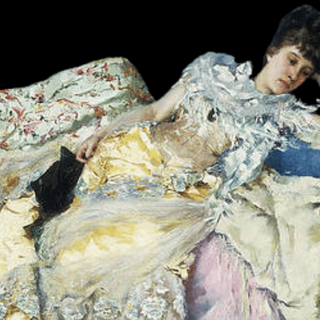
Why Some People Love Sad Music — And Others Don’t
Called the “paradox of pleasurable sadness,” sad music tends to evoke nostalgia and wonder in some people.

Sadness, by definition, isn’t a positive emotion — and by extension, not a desired state of being.
Which makes the genre of sad, somber music curious. The vulnerability it often represents affects different people in different ways — while some may enjoy the despair in tone and lyrics, others would rather press pause or skip sad songs altogether. The contradictory perception has something to do with memory association, biological response, and our emotional eloquence.
Time and again, studies say that people are drawn to sad music. Experts explain this appeal by what they call the “sadness paradox” or the “paradox of pleasurable sadness.” The idea is that people derive some satisfaction, or pleasure, out of listening to sorrowful music. But how does this paradox play out? According to experts, there’s no easy way to answer this — and, in fact, researchers are trying to understand more about the way humans react to music to this day.
People’s reaction to the emotions embedded in music is diverse, and depends on a variety of traits like “dissociation, absorption, fantasy proneness, empathy, and rumination,” according to Australian psychologists Sandra Garrido from the University of Melbourne and Emery Schubert from the University of New South Wales. “This paradox is a complex one that appears to have no single answer,” they added.
At its core, one of the greatest appeals of sad music lies in its ability to evoke nostalgia.”Sad music is a powerful trigger for nostalgic memories of foregone times. Such reflective revisiting of nostalgic memories may enhance mood, especially if the memories are related to pivotal and meaningful moments in life,” Shahram Heshmat, a behavioral economist at the University of Illinois, wrote in Psychology Today. Moreover, nostalgia is known to help us endure change, and create hope for the future — thus building a strong case for the music they are linked to.
In addition, sad music can also help an individual dealing with grief unpack their emotions by treating them at “par with the rich expressiveness of (sad) music itself,” a study from 2019 states. In doing so, it induces feelings of peacefulness and even wonder at the connection they feel with the song.
Related on The Swaddle:
Music From Happier Times Is Dominating Playlists Under Lockdown
Sad music also triggers the release of a hormone called prolactin, which can help reduce feelings of grief. Since the feeling of sadness, which led the brain to release the hormone, was second-hand — there’s no actual grief the person experienced that needs consoling, so the hormone just leaves them feeling happy. “Sad music tricks the brain into engaging a normal, compensatory response by releasing prolactin. In the absence of a traumatic event, the body is left with a pleasurable mix of opiates with nowhere else to go,” Heshmat added.
Moreover, people who experience a greater degree of empathy are also believed to like sad music more — often because they appreciate its emotional nuances and find it aesthetically beautiful. But the contradiction is also evident: since empathetic people experience emotions more deeply, how do they manage to derive pleasure from sad music without falling prey to its negative emotions?
“…sadness elicited by music arises through emotional contagion, and that the pleasure elicited by music occurs in response to our perception of the beauty of the music. As these two mechanisms occur concurrently, it is possible to experience pleasurable sadness when we listen to sad music,” a 2014 study on the “paradox of pleasurable sadness” states.
One’s music choice often reflects one’s state of mind too. But if one is sad, wouldn’t listening to somber tones make them sadder?Perhaps, but it’s also comforting. “Sad music can be experienced as an imaginary friend who provides support and empathy after the experience of a social loss. The listener enjoys the mere presence of a virtual person, represented by the music, who is in the same mood and can help cope with sad feelings,” Heshmat explains.
However, a study published last year found that people living with feelings of “persistent sadness” as a result of clinical depression may also prefer sad music — but not because of the emotion conveyed by the music. Instead, their preference was guided by the fact that sad music also tends to carry a low, toned-down level of energy, making them feel more relaxed.
Related on The Swaddle:
Why Certain Songs Get Stuck In Our Heads (And How To Get Rid of Them)
But not everyone behaves in this paradoxical manner — that is, not everyone enjoys notes of melancholy.
Given the strong association of music with our moods, music therapy, which helps individuals cope with their mental health issues, has grown in prominence. It is believed to lower blood pressure, reduce anxiety, and even target parts of the brain that traditional forms of therapy cannot. Intrigued by the effect of music on the brain, and its usage as a therapeutic intervention, researchers from the U.K. and Finland conducted a large-scale survey in 2016 of almost 2,500 people to understand how reactions to music can vary from person to person. Turns out, not everyone appreciates sad music.
Experts believe what one associates with a piece of music has a role to play here. For some, it can relate to significant personal losses like the ending of a relationship, or the death of a loved one — triggering memories that make it “painful” for them to enjoy the piece of music.
“A large number of people also associated sad music with painful experiences. Such intense experiences seemed to be mentally and even physically straining, and thus far from pleasurable,” Henna-Riikka Peltola from the University of Jyväskylä in Finland, who co-authored the 2016 study, said in a statement. Interestingly, negative feelings were more pronounced in women and younger participants, although the researchers aren’t sure why.
In general, the study also found that sad music intensified negative emotions in 10-17% of the respondents — not only worsening their mood, but also leaving them irritated, fatigued, and anxious. The study included some people who chose to listen to sad music knowing that it impacts them negatively. For them, this often becomes a “maladaptive mood-regulation strategy” to cope with negative emotions — listening to somber music intensifies emotions and could aid a “vent and release” process of sorts. But instead of helping, it ended up prolonging their “negative affective state,” the researchers noted.
It is hard to draw a consensus around the likability of this corner of music. But for what it’s worth, sad songs have existed for decades and will continue to hold their ground; researchers, on their part, will endeavor to gain deeper insights into how humans perceive music, and someday make more sense of the enduring paradox.
Devrupa Rakshit is an Associate Editor at The Swaddle. She is a lawyer by education, a poet by accident, a painter by shaukh, and autistic by birth. You can find her on Instagram @devruparakshit.
Related


Woe Is Me! “My Boyfriend’s Friends Don’t Like Me. How Do I Cope?”
